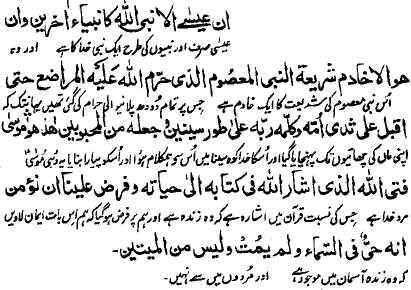1)

Your translation: "And Muhammad is but a messenger. Verily all Messengers have passed away before him. If then he dies or is slain, will you turn back on your heels?"
You tranlate this aya as "... all messengers has passed away (i.e. died) before him...". Instead of saying ‘passed’ you said 'passed away' (i.e. died). You say that while all the Prophets before Hazrat Muhammad SallAllah-o-Alaihi Wa Aalihi Wasallam have died, so Christ has also died.
Where in any arabic dictionary "khalat" or "khalo" has been translated as "death" or "to die"? It is absolutely wrong to translate it as "death". If it means death, then how should you translate:

Is it "this is the sunnah of Allah that died (or ended) befofe you"? If you translate it as this the next part of this ayah falsify your translation as:

that is, "you will not find any change in the sunnah of Allah". Allah's sunnah does not change, die or become non-existant. So "khalat" does not mean death. Here it means "rehna", "chalay ana". Its translation is "yahi Allah ki sunnat rahi hai (ya chali aa rahi hai) tum say pehlay say".
Similarly,

means "koi ummat nahi magar is main daranay wala huwa ho ya bheja gaya ho",

means "tum say pehlay bhi kai dastoor hotay rahay hain",

means "hotay rahay hain un say pehlay bhi rasool".
At another place Allah says:

Does here khalat mean that all the nations before him has died and vanished from the face of the earth? Absolutely not! yahood o nasara were present. Allah Himself mentioned the by saying ahle kitab, ahle injeel and ahle tourat.
It seems reasonable to mention here that rejectors of the life of Hazrat Masih do beleive in the life of Hazrat Mosa and say that he is alive in heavens (Noor ul Haq, Rohani khazain, vol 8, page 69):

Now they excluded Hazrat mosa from their interpretation "Verily all Messengers have passed away before him". If Mosa could be excluded then why not Masih? It is a clear example of their 'dajl' and 'faraib'.
 See, Quranic words r such that if they make sense...we take them word by word...if they seem something different...we can't just take them word by word, but we have to go deep and see what is God saying here...and it makes more sense k God means I gave natural death to Jesus (PBUH)...(as Quran also mentions everyone livinh being will taste death...which makes sense) then the thoery that Jesus (PBUH) was raised physically (which does not makes sense as many things go against this theory)
See, Quranic words r such that if they make sense...we take them word by word...if they seem something different...we can't just take them word by word, but we have to go deep and see what is God saying here...and it makes more sense k God means I gave natural death to Jesus (PBUH)...(as Quran also mentions everyone livinh being will taste death...which makes sense) then the thoery that Jesus (PBUH) was raised physically (which does not makes sense as many things go against this theory)











 hamara aur apka hisab to Khuda ne kerna hae...
hamara aur apka hisab to Khuda ne kerna hae... 




 means "koi ummat nahi magar is main daranay wala huwa ho ya bheja gaya ho",
means "koi ummat nahi magar is main daranay wala huwa ho ya bheja gaya ho",  means "tum say pehlay bhi kai dastoor hotay rahay hain",
means "tum say pehlay bhi kai dastoor hotay rahay hain",  means "hotay rahay hain un say pehlay bhi rasool".
means "hotay rahay hain un say pehlay bhi rasool".

